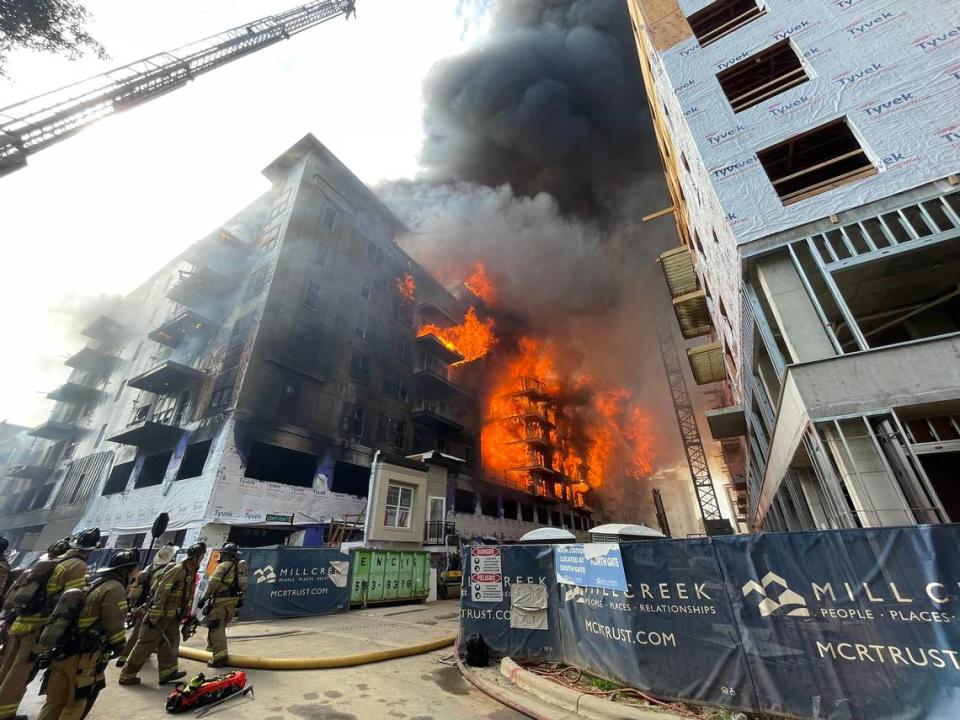Deaths from SouthPark fire were preventable, lawsuit from families of victims says
The families of two construction workers killed in last year’s massive fire in SouthPark have sued the developer and others, alleging that a series of failures led to their foreseeable and preventable deaths.
The federal lawsuit, filed Thursday by the families of Demonte Sherrill and Reuben Holmes, alleges that Mill Creek Residential Trust, Kentucky Overhead Door, Inc. and related companies broke numerous laws and requirements, which in turn contributed to the ignition and rapid spread of the May 18 fire.
“The violations prevented egress, impeded firefighter rescue efforts and thwarted fire suppression efforts, thus allowing the Fire to spread, effectively unchecked, until it killed Demonte Sherrill and Reuben Holmes,” the suit alleges.

Mill Creek Residential said in a statement that the company is aware a complaint has been filed but said it is not the company’s policy to comment on pending litigation.
“As we have previously stated, our sympathies are with the families affected by the tragic fire,” the statement said.
Holmes and Sherrill were on the sixth floor of an apartment building under construction — the 239-unit Modera SouthPark complex — when the fire broke out. They were more than 460 feet from the only stairway exit on that floor, state workplace safety inspectors found.
Inspectors found the exits of the seven-story wooden building weren’t arranged to provide an easy way out for the workers.
The supervisor of those two workers, Keith Suggs, said he instructed them by phone to get on the floor and crawl toward the stairwell exit during the fire. But they said the smoke was too thick for them to see the exit, Suggs said. Their remains were later discovered in the charred rubble.
Lawsuit brings more details about what occurred
The lawsuit offers more information on why the men were trapped during a historic fire that many others escaped.
About two weeks before the fire, the contractors removed a temporary stairway that was near the spot where Sherrill and Holmes were installing windows and doors on the day of the fire, the lawsuit says.
That left just the single stairway on the building — one that was far away from the two victims, the complaint says.

The building also lacked required water connections which would have allowed firefighters to suppress the fire and rescue Sherrill and Holmes, the suit alleges.
“Rescue attempts were delayed and responding firefighters endangered when they were told, wrongly, by the Mill Creek Defendants, that required water connections were available, and entered the burning building to connect their hoses, only to find that the connections did not exist,” the lawsuit states.
State inspectors also found the employer did not develop and implement an emergency response plan, and that it had not established an alarm system to alert employees about such emergencies.
The five-alarm blaze not only killed Sherrill and Holmes, but endangered many others, the suit contends. Firefighters had to rescue 15 other workers who got stuck in the building.
Suit blames “inherently dangerous” building style
The apartment building had five floors of wood-framed construction built over two floors of non combustible concrete — an increasingly common type of building known as podium construction.
The suit alleges the contractors knew that a fire during construction “would be substantially and inherently dangerous.”
The blaze erupted after a diesel motor for a generator caught fire, igniting spray foam insulation and wood-framing on the multi-story building. More than 90 firefighters worked to get the fire under control.
Both the generator and spray foam were inside a mobile trailer.
According to the complaint, the workers intended to park the trailer outside of the building, but “were instructed by a superintendent/employee of the Mill Creek Defendants to drive the truck and Trailer inside the parking deck for Building B, situated immediately below the five (5) floors of wood construction vulnerable to fire during construction.”
Around 7:30 a.m., a worker started the generator, walked to the floor above and began spraying the foam. About a half-hour later, the spray gun stopped working.
When the worker returned, he found the trailer on fire, according to the complaint.
The generator’s engine malfunctioned because of a “lack of proper maintenance, lack of lubrication and overuse,” the lawsuit states.
The suit alleges that the defendants allowed and approved the use and storage of the combustible liquid in the parking deck, “even though the deck was cluttered with flammable construction materials and debris, including new flammable bathtubs, remnants of wood, and other flammable materials.”
Said Faith Fox, an attorney representing the victims’ families: “We are determined to see justice served and to ensure that no other family has to endure such a preventable loss. Defendants must be held accountable for their egregious disregard for basic safety standards and human life.”

